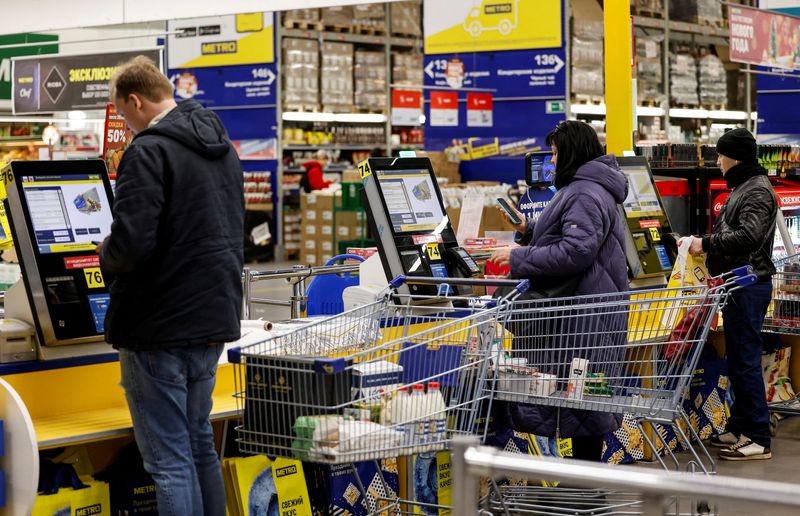(Reuters) - Russia's economy ministry improved its expectations for 2024 gross domestic product (GDP) growth to 2.8% from 2.3% in new forecasts published on Tuesday, while envisaging a weaker rouble and shrinking current account surplus in the years to come.
Russia's economic rebound from a 2022 slump relies heavily on state-funded arms and ammunition production as Moscow prosecutes its war in Ukraine, masking problems that are hampering an improvement in Russians' living standards.
The International Monetary Fund this month raised its 2024 forecast for Russia's GDP growth to 3.2% from the 2.6% projected in January, pointing to strong government spending and investment related to the war, as well as higher consumer spending in a tight labour market and strong oil export revenues in spite of Western sanctions.
Economy Minister Maxim Reshetnikov, speaking at a government meeting, said the main factor behind economic growth was domestic consumer and investment demand.
The economy ministry expects GDP growth of around 2.3% in 2025-2026, while the rouble is forecast to make a steady decline to trade at an average of 101.2 to the dollar in 2026, compared with current levels around 93.
Russia expects oil prices to fall, the forecast showed, and the export price of Russian oil until 2027 is seen at $65 a barrel. Russia's Urals crude currently trades at around $79 per barrel.
Russia's success in circumventing the West's oil price cap, through redirecting exports to friendly destinations and the opaque ownership of a so-called shadow fleets of ships to transport oil, has eased sanctions pressure, but reduced export revenues can still harm the budget deficit.
RISKS
Russia's war in Ukraine is draining state coffers - the liquid part of Moscow's rainy day fund has fallen sharply since the invasion - but economists say that even oil prices as low as $60 a barrel still allow Russia to retain a fiscal safety net that could last for years.
Reduced export revenues are seen squeezing Russia's trade and current account balances. The trade balance is expected to drop by more than 30% in the coming years, compared with previous estimates and expectations for the current account surplus are down threefold, to as low as $25.3 billion in 2026.
"Risks also remain," Reshetnikov said. "Externally, this is first and foremost a slowdown in the global economy as a whole and in the economies of countries that are Russia's main trading partners, as well as continued sanctions pressure."
The ministry improved forecasts for real disposable incomes and retail trade. Incomes, partially driven by high government spending and the tight labour market, are seen increasing 5.2% in 2024, up from 2.7% growth in the previous forecast.
The ministry expects inflation to end the year at 5.1%, above the previous estimate and the central bank's 4% target. Analysts expect interest rates, currently at 16%, to stay in double digits until at least mid-2025.
The ministry does not anticipate Russia solving its labour shortage conundrum any time soon, according to the forecasts. Unemployment, currently at a record low 2.8%, is seen hovering at 3% from 2024-2027.
